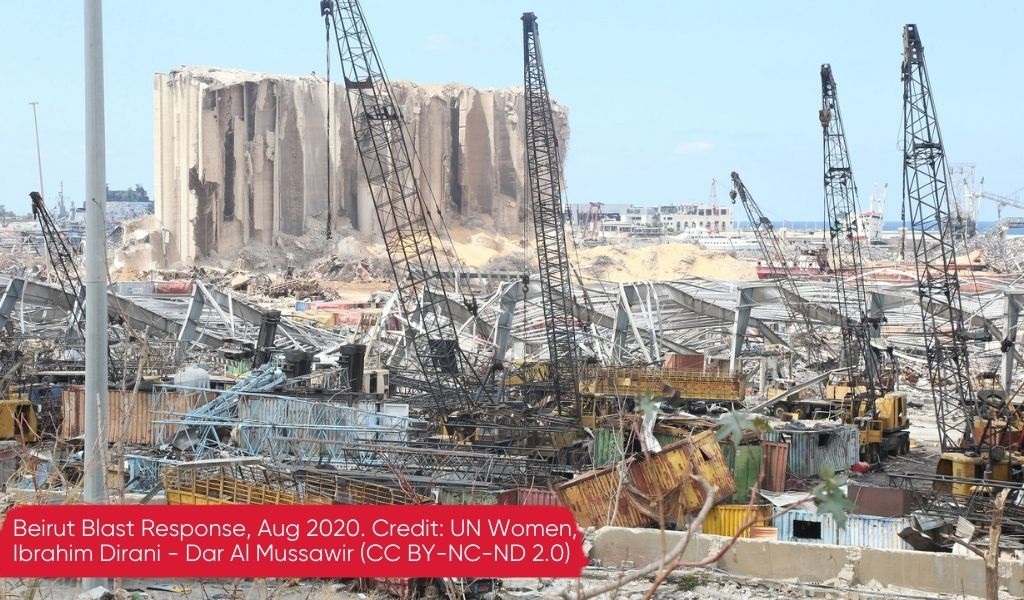August 4, 2020, was a date that shocked the world. Time stopped at 6:07 pm. People around the world watched over and over at video footage of the biggest non-nuclear explosion in the 21st century that took place at Beirut port in Lebanon.

The calamity killed 217 people, left more than 7500 people injured and a whole population traumatized. Destruction and economic loss are in billions of dollars. The explosion was not haphazard; not just a chemical reaction of tons of ammonium nitrate stored in negligence at the port. It was the tangible and visible result of decades of poor governance, corruption and a sectarian power struggle in Lebanon.
Corrupt governance and clientelism had rendered Lebanon a failed state, when once upon a time it had been the beacon of the Middle East. By 1907, the port of Beirut was on a level with Salonica, handling 11 percent of the trade of the Ottoman Empire (Mansel, 2010). But by 2019, after centuries of cultural, educational, and mercantile prosperity, and openness to both the East and the West, the Lebanese ship hit the tip of the iceberg.
Revolting for change
In October 2019, Lebanese people took to the streets in every city to voice aloud their anger against a political class that eviscerated the country. The economy collapsed, the schemes in modern times against a whole population.
Protestors raised the slogan “All of them means all of them” to express their rejection of the whole political class. Moreover, though the country is stuck in a political and economic quagmire, . After the blast, the government resigned. Since then, the country is still in a governmental vacuum. In the same way they shipped the nitrates to the port of Beirut some years ago and stored them to become a ticking bomb in the heart of the capital, they are now dragging the formation of the cabinet for further destruction and fall.
Divide and rule
Lebanon is a country with unique cultural diversity. A diversity in which the political class invests in nurturing hatred and fear to reinforce Dividing the population into sectarian communities also makes it easier for the political class to present themselves as their communities’ protectors and saviours, while actually denying them their basic rights.
Back in October 2019 people were united as a nation to overthrow a corrupt regime and a traitor class for the first time in the history of Lebanon. Never before had Lebanon witnessed people gathering in public places, occupying them, and raising tents where they were meeting, discussing, and debating. The public sphere became home to every patriot.
Protest victories
The two biggest victories of the October 2019 protests are: the emergence of the notion of citizenship that had long been absent and the unruly politics that was taking place in the public sphere where people found alternatives to engage in political life. It is this kind of insistence on new languages of politics or new modes of political action, that challenges what is acceptable and intelligible to the state that broadly characterizes unruly politics. They don’t necessarily make permanent or even very positive change, but they do elicit a response, or force official attention to the specific concerns being voiced (Akshay, 2012).
Good governance’ outcomes of pro-poor policy decisions, of government responsiveness, of respect for human rights, of peace-building, of democratic representation, of accountable and participatory service delivery – resulted not from top-down government initiatives, from donor-sponsored reform programmes, from a well-functioning electoral process or from orderly citizen participation but from the unruly actions of poor and marginalised people (Shankland et al., 2011).
Fighting for dignity
A year on and not a single person has been held accountable for the massacre from the explosion. Dozens of Lebanese MPs have pledged support for a parliamentary request allowing a special judicial body to investigate and rule on the role of ex-Ministers and the caretaker Prime Minister in last year’s explosion, that many argue will shield them from prosecution.
The blast depressed the population, hundreds of thousands have fled the country, millions feel stuck with no big hopes, and others still believe in the power of people to make a difference. Post-August 4 is an opportunity for change in Lebanon. It is a chance for people “to be angry to the right degree, and at the right time, and for the right purpose.” The city can be reconstructed, and the government can remain rentier to international donors, but new generations will not have the chance to live in dignity if citizens do not take power over their country again, refute disguised democracy and insist on creating a just leadership.